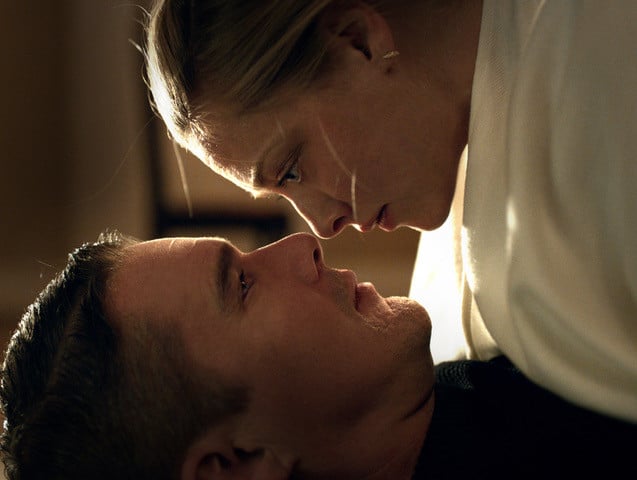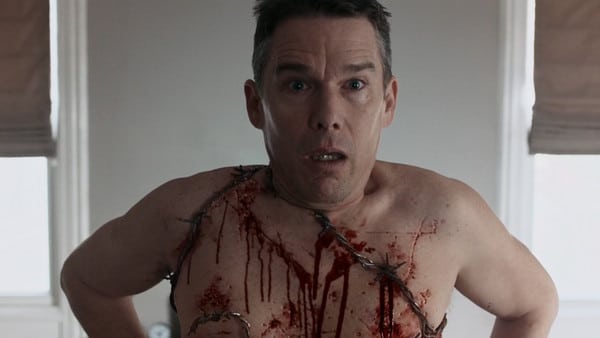
By Guest Contributor Matt Harries
In an era where a phrase such as ‘world building’ has entered the lexicon of the expectant cinema-goer, it is all too easy for the brightest lights, most groundbreaking camera work and most stupendous action sequences to steal the hearts and minds of the viewer. Conversely, it seems that all too often the films which make the loudest noises leave the faintest trace, as we watch beautiful people with impossible powers saving the world with almost numbing regularity. In the case of Paul Schrader’s First Reformed, we have a film which asks questions relating to the weightiest of subjects, but does so with what seems like an uncharacteristic subtlety in modern mainstream cinema.
It is unusual for me to discover a film via the score, but that’s how I first came to know of the existence of First Reformed. Lustmord is a name familiar to fans of the Dark Ambient sub-genre and it was via his Bandcamp page that I discovered that the characteristically ominous strains of his work were being used in a soundtrack. This had the effect of imbuing the film with a sense of dread and anticipation before I even knew what it was about, as Lustmord has carved out his career as a supreme master of the audial sense of foreboding. His music can also be described as cavernous, oceanic, intense and chilling, so I was instantly expecting something in the realm of a psychological horror. While there are one or two hard-hitting moments which can be described as horrific, what is delivered is far subtler than some typical horror tropes such as the malign supernatural or extra-terrestrial entity. The source of the inauspicious threat is very much part of the zeitgeist, discussed across all platforms on a daily basis; namely, our destruction of the planet.
It is difficult to talk about the nuts and bolts of First Reformed without a nod to the personal history of writer and director Paul Schrader. Perhaps inevitably known as the screenwriter behind Martin Scorcese’s 1976 classic Taxi Driver, Schrader has made it known on several occasions that the medium of screenwriting should be used as an opportunity for catharsis. Indeed, he suggests it is only through the willingness to ‘drop your pants and show your own laundry’ that writers should work in the field. A cursory look into his past reveals that while espousing the ‘self-therapy’ of writing, Schrader himself once suffered a stomach ulcer due to excessive drinking, as well as other turmoils suffered under unsustainable stress. Given these experiences, as well as a self-professed fascination with characters who go against the grain of society and who seem to act against their own best interests, it is clear that the film’s central character Reverend Toller (played by Ethan Hawke) represents to some extent Schrader’s lifetime of interests and experiences as a writer and a man.
Toller is himself a writer, albeit he writes in a journal with no intent of publication or witness by another – other than his Creator. The goal is wholly cathartic – ‘when writing about oneself one should show no mercy’. Although often painful and not without moments self-recrimination, this process of daily confessional is carried out with an ascetic’s rigour. The exercise of withholding nothing becomes increasingly influential in Toller’s journey throughout the film. The events that transpire upon meeting troubled young couple Mary (Amanda Seyfreid) and Michael (Phillip Ettinger), act as a spark to tinder against his increasingly stark mindset of unflinching honesty.
It is heavily pregnant Mary who introduces herself and Michael to Toller. She confides that Michael wishes her to terminate their unborn child. Upon meeting him, Toller learns that the cause of Michael’s despair is the what he sees as the inevitable collapse of human civilisation within his own lifetime, due to the wilful destruction of our natural world for fuel and resource. How, he reasons, can he justify bringing his daughter into a world which faces an inevitable cataclysm of environmental and subsequent societal collapse? Michael strongly questions Toller about the folly of raising a child in a doomed world. Sensing a challenge, the pastor responds with vigour and asserts that Michael’s daughter is ‘as (alive) as a tree. As an endangered species…full of the beauty and mystery of nature. A life without despair is a life without hope,’ he continues. ‘Holding these two ideas in our head is life itself.’

For all Toller’s wise words, in private he continues to act against his own interests in a way which is strikingly reminiscent of Paul Schrader’s struggles as a young writer back in the 70s. His journal writing is accompanied by the nightly drinking of whisky, by the bottle, despite his own escalating ill health. The despair which ultimately proves too much for Michael begins to consume him too, until, seen as an anachronism by the Church’s ruling body and harbouring an increasing sense of indignant rage, he begins to formulate ideas of retribution. Here there is a clear parallel with Schrader’s earlier creation Travis Bickle, memorably portrayed by Robert De Niro. Toller too is a former member of the military, and like Bickle is drawn toward a violent solution to the problems imposed by the world, one that carries the stain of impotent fury and a state of mental fortitude on the brink of collapse. Toller’s actions declare a willingness to stand up and make a mark for the fallen heroes of the struggle against corporations and governments who damage the planet for gain, while also acting as an outward expression of his own changing attitudes. Fuelled by the words of Michael ringing in his ears, as well as the increasing sense of isolation inside his church, he begins to dream of martyrdom.
While it may be easy to see Toller as a cross between Taxi Driver’s Bickle and Michael Douglas’s D-Fens in Falling Down, First Reformed defies being easily categorised alongside those films, specifically by introducing Amanda Seyfreid’s character Mary as a source of compassionate, inclusive energy, one that acts as a counterpoint to the more violently masculine impulses shown by other characters. Despite her own fears and vulnerability, she refuses to condemn Michael for his actions and later on, as she becomes closer to Toller, she introduces a ray of light into his increasingly dark world view.
The film’s final sequence could have gone in one of several directions, with Schrader apparently having written two different endings before settling on the one he did. The chosen ending perhaps suggests love is the mechanism by which the opposing forces of hope and despair are balanced. While this sentiment has a well worn feel to it, it is the power of First Reformed to provoke questions of the viewer that is perhaps its great strength. There is the question of responsibility – of state, of Church and of the individual. Not only toward the natural world, which through greed and apathy faces what many observers agree is a mounting crisis, but crucially toward ourselves. Can we each face our maker, our conscience, or our own sense of morality with absolute honesty? In the light of this fearless honesty we may choose to shine upon our own actions, are we able to recognise a way to balance the light and darkness in ourselves and thus the world? If so we may, like writer Paul Schrader, yet have a say in which way the story goes.
